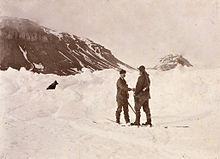Frederick George Jackson

Frederick George Jackson (born March 6, 1860 in Coughton near Alcester , Warwickshire , † March 13, 1938 in London ) was a British polar explorer and adventurer.
Education and youth
Jackson, who was educated at Denstone College , a private boarding school in Staffordshire , spent his youth in Australia and made extensive trips to the Australian desert regions as a teenager . Back in Great Britain he graduated from Edinburgh University .
First arctic experience
In 1886–1887, Jackson came to Arctic waters for the first time on a trip aboard a whaler .
In 1893 he traveled 3000 miles on sledges through the Siberian tundra and Lapland and explored the area between Ob and Pechora . He described his experiences in the book The Great Frozen Land , published in 1895 .
The Jackson-Harmsworth Expedition
1894-1897 Jackson was entrusted with the command of the Jackson Harmsworth expedition (named after the polar explorer or the financier of the expedition, the British publisher Alfred Harmsworth ). The aim of this enterprise was the exploration of Franz-Josef-Land . A base camp was set up at Cape Flora on Northbrook Island , and Jackson spent three years mapping and surveying Franz Josef Land. He proved that Franz-Josef-Land was an archipelago and not a continent . In 1896 he met Fridtjof Nansen and Hjalmar Johansen at Cape Flora , who had gone to Franz-Josef-Land after their unsuccessful attempt to reach the North Pole and were considered missing in Europe, and helped them return to Norway.
As a result of this trip, he received the Knight's Cross for the Norwegian Order of Saint Olav in 1898 . The Paris Geographical Society awarded him a Medal of Honor. Jackson himself wrote A Thousand Days in the Arctic (1899).
Travel in Africa
In the Second Boer War he served on the British side and was wounded. His experience in South Africa encouraged him to focus his research on Africa. During the 1920s he made extensive trips to Africa, crossing the continent from east to west, exploring Mashonaland , Matabeleland , Northern Rhodesia , Urundi and Rwanda . He visited the sources of the three great African rivers ( Nile , Zambezi , and Congo ) and he crossed the Congolese rainforest from Lake Kiwu to Lualaba .
Death and honors
Jackson spent the last years of his life on his houseboat Afterglow on the Thames , and after the Second World War a memorial was erected to him in St Paul's Cathedral in London. In addition, Jackson Island ( Russian Остров Джексона; Ostrow Dscheksona ) on Franz Josef Land was named after him. The same applies to the Jackson Tooth , a nunatak in the Antarctic.
literature
- Jackson, Frederick: The great frozen land . Macmillan, New York 1895. Accessed online via the Internet Archive .
- Jackson, Frederick: A thousand days in the Arctic . Harper & Brothers, London, New York 1899. Accessed online via the Internet Archive .
- Jackson, Frederick: The Lure of Unknown Lands . G. Bell and Sons, London 1935.
Web links
- Frederick George Jackson , short biography on the homepage of the Queen's Royal Surrey Regiment (English)
- Days in the Arctic , article about Jackson in Harper's Magazine , September 1898
- Frederick George Jackson , entry in the Archives Hub archive portal
| personal data | |
|---|---|
| SURNAME | Jackson, Frederick George |
| BRIEF DESCRIPTION | British polar explorer and adventurer |
| DATE OF BIRTH | March 6, 1860 |
| PLACE OF BIRTH | Coughton at Alcester , Warwickshire |
| DATE OF DEATH | March 13, 1938 |
| Place of death | London |


